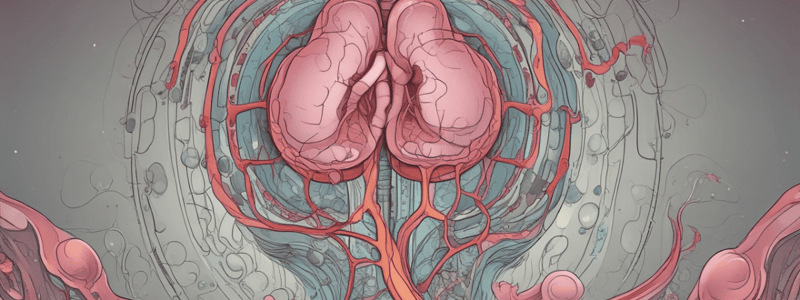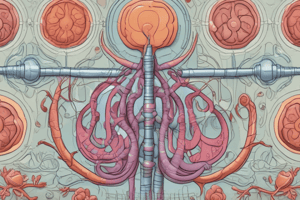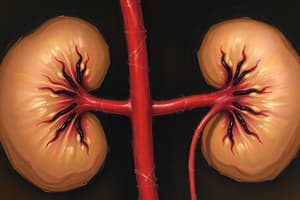Podcast
Questions and Answers
What is the primary reason for edema in patients with damaged glomeruli?
What is the primary reason for edema in patients with damaged glomeruli?
- Increased glomerular filtration rate
- Increased capillary oncotic pressure
- Decreased protein levels in the bloodstream (correct)
- Inflammation of the glomerulus
What is the primary cause of chronic renal failure in the U.S.?
What is the primary cause of chronic renal failure in the U.S.?
- Diabetes
- Nephrotic syndrome
- Hypertension
- Inflammation of the glomerulus (correct)
What is the typical time frame for the development of PSGN after an infection?
What is the typical time frame for the development of PSGN after an infection?
- 1-3 days
- 14-21 days
- 7-12 days (correct)
- 5-7 days
What is the prognosis for children who develop PSGN?
What is the prognosis for children who develop PSGN?
What is the minimum amount of protein lost in the urine per day to be classified as nephrotic syndrome?
What is the minimum amount of protein lost in the urine per day to be classified as nephrotic syndrome?
What is the mechanism by which the antigen-antibody complex causes injury to the glomerulus?
What is the mechanism by which the antigen-antibody complex causes injury to the glomerulus?
What is the result of decreased protein levels in the bloodstream in patients with damaged glomeruli?
What is the result of decreased protein levels in the bloodstream in patients with damaged glomeruli?
What is the difference in prognosis between children and adults who develop PSGN?
What is the difference in prognosis between children and adults who develop PSGN?
Which type of cast is formed when protein within the tubules gel?
Which type of cast is formed when protein within the tubules gel?
What is the primary indicator of nephron death?
What is the primary indicator of nephron death?
At what percentage of normal GFR does stage three to four of chronic renal failure occur?
At what percentage of normal GFR does stage three to four of chronic renal failure occur?
What is the primary cause of metabolic acidosis in chronic renal failure?
What is the primary cause of metabolic acidosis in chronic renal failure?
What is the hallmark feature of end-stage renal disease?
What is the hallmark feature of end-stage renal disease?
What is the primary mechanism of chronic renal failure?
What is the primary mechanism of chronic renal failure?
What is the primary indicator of glomerular injury?
What is the primary indicator of glomerular injury?
What is the primary function of the nephron in regulating electrolyte balance?
What is the primary function of the nephron in regulating electrolyte balance?
What is the primary determinant of glomerular filtration?
What is the primary determinant of glomerular filtration?
Which of the following is a characteristic of Syndrome of Inappropriate ADH release?
Which of the following is a characteristic of Syndrome of Inappropriate ADH release?
What is the effect of increased ADH release on urine concentration?
What is the effect of increased ADH release on urine concentration?
What is the rate at which fluid filters from the blood into the Bowman's capsule?
What is the rate at which fluid filters from the blood into the Bowman's capsule?
What is the effect of vasoconstriction of the afferent arteriole on GFR?
What is the effect of vasoconstriction of the afferent arteriole on GFR?
Which of the following is a characteristic of diabetes insipidus (DI)?
Which of the following is a characteristic of diabetes insipidus (DI)?
What is the effect of decreased cardiac output on GFR?
What is the effect of decreased cardiac output on GFR?
Which of the following is a risk factor for diabetes insipidus (DI)?
Which of the following is a risk factor for diabetes insipidus (DI)?
What is the main function of the ascending loop in the nephron?
What is the main function of the ascending loop in the nephron?
What is the primary effect of ADH on the kidney?
What is the primary effect of ADH on the kidney?
What is the role of aldosterone in the distal tubule?
What is the role of aldosterone in the distal tubule?
What is the effect of ADH on blood pressure?
What is the effect of ADH on blood pressure?
What is the consequence of increased water reabsorption in the kidney?
What is the consequence of increased water reabsorption in the kidney?
What is the result of sufficient ADH in the collecting tubules?
What is the result of sufficient ADH in the collecting tubules?
What is the characteristic of urine in Diabetes Insipidus?
What is the characteristic of urine in Diabetes Insipidus?
What is the effect of the Renin-Angiotensin-Aldosterone System (RAAS) on the ECF volume?
What is the effect of the Renin-Angiotensin-Aldosterone System (RAAS) on the ECF volume?
What is the effect of ADH on the collecting tubule?
What is the effect of ADH on the collecting tubule?
What is the purpose of the continuous recycling of Na between the filtrate and the medullary interstitium?
What is the purpose of the continuous recycling of Na between the filtrate and the medullary interstitium?
What is the structure that receives the filtrate from the nephrons and transmits it to the renal pelvis?
What is the structure that receives the filtrate from the nephrons and transmits it to the renal pelvis?
What is the consequence of decreased ADH production in the body?
What is the consequence of decreased ADH production in the body?
What is the role of ADH in maintaining blood volume?
What is the role of ADH in maintaining blood volume?
What is the hormonal influence that helps the kidney maintain water and sodium homeostasis?
What is the hormonal influence that helps the kidney maintain water and sodium homeostasis?
What is the effect of systemic vasoconstriction on the kidney?
What is the effect of systemic vasoconstriction on the kidney?
What is the effect of ADH on the distal tubule?
What is the effect of ADH on the distal tubule?
Flashcards are hidden until you start studying
Study Notes
Glomerulonephritis and Nephrotic Syndrome
- Edema in patients with glomerulonephritis is caused by the loss of protein in the urine due to damage in the glomerulus, leading to low protein (albumin) levels in the bloodstream, decreased capillary oncotic pressure, and fluid leakage into the interstitium.
- Inflammation of the glomerulus is the leading cause of chronic renal failure in the US, accounting for half of the people with end-stage renal disease.
- PSGN (post-streptococcal glomerulonephritis) is the most common form of glomerulonephritis, typically occurring 7-12 days after an infection, due to antigen-antibody complex formation.
- PSGN has a favorable prognosis in children, with 95% recovering without further renal damage, but only 60% of adults recover favorably.
Nephrotic Syndrome
- Nephrotic syndrome is a constellation of clinical findings due to massive protein loss in the urine, regardless of the cause of kidney damage.
- Patients with nephrotic syndrome lose over 3.5 g of protein in their urine per day.
- Hyaline casts indicate possible damage to the glomerular capillary membrane, permitting protein leakage.
- RBC casts indicate glomerular injury, while WBC casts indicate infection, interstitial injury, or tubular damage.
- Granular casts represent partially decomposed cellular casts, and broad casts develop in atrophied and dilated nephrons, indicating nephron death.
Chronic Renal Failure
- Chronic renal failure represents a progressive and irreversible destruction of kidney structures.
- The most common etiologies include diabetes, hypertension, glomerulonephritis, and polycystic kidney disease.
- Stages of chronic renal failure include:
- Stage 1-2: diminished renal reserve, with GFR dropping to 60% of normal, but BUN and CR remaining normal.
- Stage 3-4: renal insufficiency, with GFR decreasing to 50-20% of normal, and azotemia, anemia, and hypertension developing.
- Stage 4-5: renal failure, with GFR decreasing to 20-5% of normal, and kidneys unable to regulate volume and solute composition.
- End-stage renal disease (ESRD), with GFR less than 5%, requiring dialysis or transplantation for survival.
Glomerular Filtration Rate (GFR)
- GFR is the rate at which fluid filters from the blood into the Bowman's capsule and is dependent on renal blood flow (RBF).
- A decrease in cardiac output can decrease RBF, ultimately decreasing GFR.
- The major determinant of glomerular filtration is the blood pressure within the glomerular capillary network, which is regulated by RBF.
Renal Physiology
- Blood flows into the glomerulus via the afferent arteriole, and vasoconstriction of the afferent arteriole can decrease GFR.
- The descending loop of Henle has more reabsorption of H2O, while the ascending loop has more reabsorption of Na+ and Cl-.
- The distal tubule has more reabsorption of Na+, and the hormone aldosterone acts on the distal tubule to further increase reabsorption of Na+.
- The collecting tubules have more reabsorption of water in the presence of ADH (vasopressin), resulting in a highly concentrated urine.
Hormonal Influences
- The renin-angiotensin-aldosterone system (RAAS) regulates the ECF volume by regulating sodium content.
- ADH has two effects: vasoconstriction, increasing blood pressure, and increasing the permeability of the distal tubule and collecting duct membrane to water, increasing reabsorption of water.
- Diabetes insipidus is a condition where insufficient ADH is produced, resulting in minimal to no reabsorption of water in the collecting tubule, increased urine production, and dilute urine.
Studying That Suits You
Use AI to generate personalized quizzes and flashcards to suit your learning preferences.




